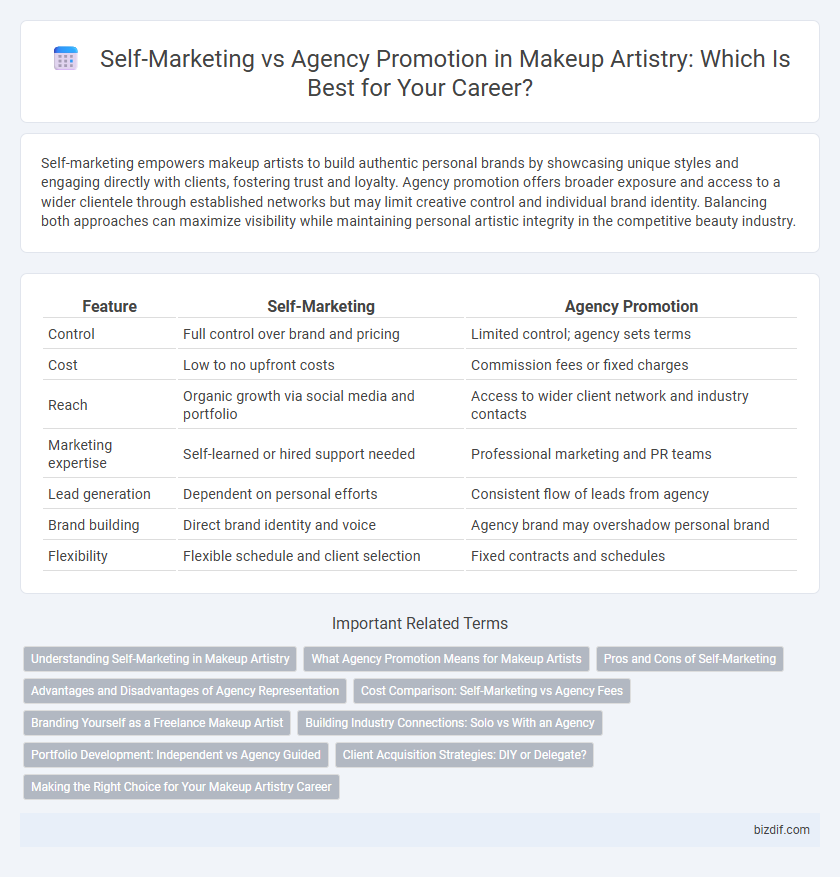Self-marketing empowers makeup artists to build authentic personal brands by showcasing unique styles and engaging directly with clients, fostering trust and loyalty. Agency promotion offers broader exposure and access to a wider clientele through established networks but may limit creative control and individual brand identity. Balancing both approaches can maximize visibility while maintaining personal artistic integrity in the competitive beauty industry.
Table of Comparison
| Feature | Self-Marketing | Agency Promotion |
|---|---|---|
| Control | Full control over brand and pricing | Limited control; agency sets terms |
| Cost | Low to no upfront costs | Commission fees or fixed charges |
| Reach | Organic growth via social media and portfolio | Access to wider client network and industry contacts |
| Marketing expertise | Self-learned or hired support needed | Professional marketing and PR teams |
| Lead generation | Dependent on personal efforts | Consistent flow of leads from agency |
| Brand building | Direct brand identity and voice | Agency brand may overshadow personal brand |
| Flexibility | Flexible schedule and client selection | Fixed contracts and schedules |
Understanding Self-Marketing in Makeup Artistry
Understanding self-marketing in makeup artistry involves building a personal brand through social media platforms like Instagram and TikTok, showcasing a diverse portfolio, and engaging with a target audience directly. Mastery of content creation, including before-and-after transformations and makeup tutorials, can significantly increase visibility and client trust. Effective self-marketing empowers artists to control their pricing, client relationships, and creative direction without relying on agency representation.
What Agency Promotion Means for Makeup Artists
Agency promotion for makeup artists involves representation by professional agencies that connect them with clients, brands, and high-profile projects, increasing their visibility in the industry. Agencies provide access to exclusive opportunities, negotiate contracts, and manage bookings, allowing artists to focus on their creative work. This structured support system elevates the artist's career by leveraging the agency's network and reputation to secure consistent, high-quality gigs.
Pros and Cons of Self-Marketing
Self-marketing in makeup artistry allows greater creative freedom and direct client relationship building, enhancing personal brand authenticity and control over pricing strategies. However, it requires substantial time investment in social media management, networking, and business development, often diverting focus from the core artistic work. Limited outreach compared to agency promotion can result in slower client acquisition, but self-marketing fosters a unique, personalized reputation essential for long-term career growth.
Advantages and Disadvantages of Agency Representation
Agency representation in makeup artistry offers access to a broader client network and professional opportunities but often involves commission fees and less control over brand image. Agencies provide valuable industry connections and handle logistics, reducing self-promotion efforts yet may limit creative freedom and scheduling flexibility. Balancing agency advantages with personal branding needs is essential for maximizing career growth and maintaining client relationships.
Cost Comparison: Self-Marketing vs Agency Fees
Self-marketing as a makeup artist typically involves lower upfront costs, relying on social media, personal websites, and direct client outreach to build clientele, which can save hundreds to thousands in agency fees. Agencies often charge commissions ranging from 15% to 30% per booking, significantly reducing overall income despite providing marketing and administrative support. Comparing costs, self-marketing demands more time investment but maximizes profit margins, while agency promotion offers convenience at a higher financial expense.
Branding Yourself as a Freelance Makeup Artist
Branding yourself as a freelance makeup artist involves creating a unique image that highlights your style, skills, and professionalism, helping you stand out in a competitive market. Building a strong online presence through social media platforms, a professional portfolio website, and client testimonials directly enhances your visibility and client trust. Unlike agency promotion, self-marketing allows personalized control over your brand narrative and client relationships, fostering long-term independence and tailored opportunity growth.
Building Industry Connections: Solo vs With an Agency
Building industry connections as a solo makeup artist relies heavily on personal networking, social media presence, and attending events to establish a direct rapport with clients and collaborators. Working with an agency provides access to its established network, offering opportunities to connect with high-profile clients, photographers, and brands more efficiently. Both methods are crucial; solo artists gain intimate client relationships, while agencies leverage broader industry connections for larger-scale projects.
Portfolio Development: Independent vs Agency Guided
Portfolio development in makeup artistry varies significantly between self-marketing and agency promotion. Independent artists have full creative control, allowing personalized curation that directly reflects their unique style and versatility, while agency-guided portfolios benefit from professional feedback, strategic project selection, and access to high-profile clients that enhance marketability. Balancing authenticity with industry standards is crucial for a compelling portfolio that attracts diverse clientele and job opportunities.
Client Acquisition Strategies: DIY or Delegate?
Makeup artists face a strategic choice between self-marketing and agency promotion for client acquisition, where self-marketing leverages personalized branding through social media, portfolio development, and direct networking for control and cost-efficiency. In contrast, agency promotion delegates client sourcing to specialized agents who offer broader industry connections and negotiated contracts but require commission fees and less autonomy. Evaluating client acquisition strategies involves balancing the benefits of DIY marketing--such as authenticity and flexible pricing--with the reach and professional negotiation skills provided by agencies.
Making the Right Choice for Your Makeup Artistry Career
Choosing between self-marketing and agency promotion significantly impacts your makeup artistry career trajectory, where self-marketing offers autonomy and direct client engagement crucial for building a unique brand identity. Agency promotion provides structured opportunities, wider industry connections, and steady work, which can accelerate professional growth, especially for emerging artists. Evaluating personal strengths, career goals, and market demands ensures selecting the most effective path to establish your reputation and maximize earnings in the competitive makeup artistry field.
Self-marketing vs Agency promotion Infographic

 bizdif.com
bizdif.com